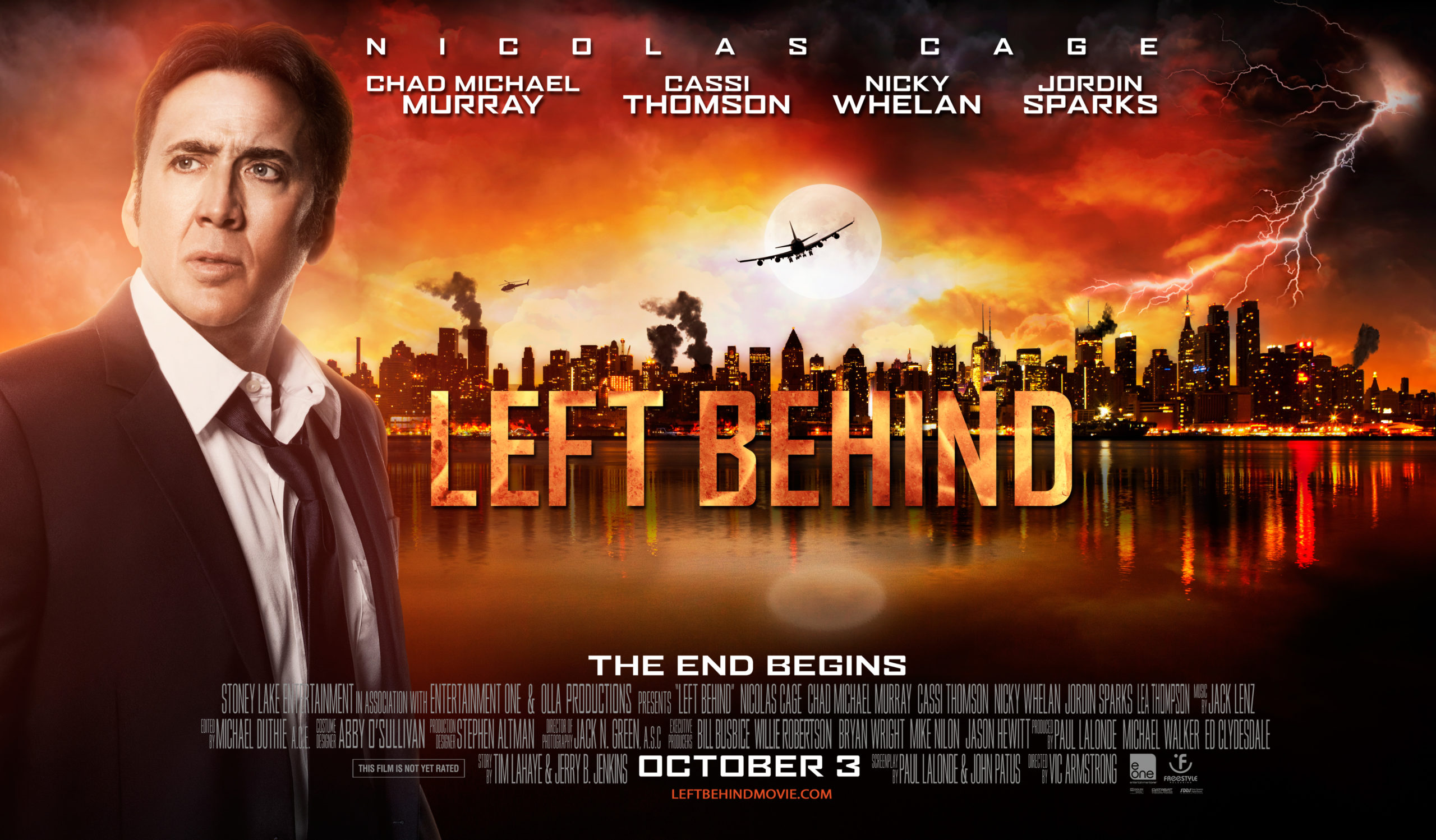5 Tips for Handling the New Left Behind Movie

This weekend, the Left Behind novels will see their second film adaptation, this time starring a crazy-eyed Nicholas Cage in place of the previous film’s curly-haired Kirk Cameron. Unfortunately, this means that our news feeds are about to be filled with a new round of blog posts and articles discussing “the rapture,” most of which will likely not be terribly positive or constructive.
So what does someone who graduated from a seminary that believes and teaches a pretribulational rapture do with an event like the release of the Left Behind movie and the subsequent discussions that follow it? Fight it out in the blogosphere? Organize a trip to the theater? Hide until it’s all over?
Wherever you are personally on these issues, here are five general tips that should be helpful for Christians of every stripe:
1. Prioritize Hope
In the midst of global suffering, racial violence, and religious wars, the impossibly wonderful idea we find at the end of the book of Revelation—that the eternal Son of God will restore all things, bringing heaven down to a new earth—should be a source of deep and sustaining hope.
Sadly, when Christians talk about eschatology, this glorious truth tends to get lost in the mucky warfare of fights over details and timelines. These details are certainly worth exploring, discussing, and, most importantly, believing with conviction, but whatever conclusions we come to need to be rightly ordered among other more centrally biblical ideas like that the incarnate Jesus lives, that he will return to judge the quick and the dead, and that he will destroy evil and reign forever. One of Lewis Sperry Chafer’s greatest worries was that teaching about the end times would overshadow his true passion and the reason he founded DTS— the centrality of the Gospel. When we allow this to happen, we can miss the forest (He is coming!) for the trees (timelines and such) and thus blur the core focus on our great hope.
2. Deescalate the Rhetoric
Have you ever heard of “Godwin’s Law”? It pokes fun at Internet debates, saying, “As an online discussion grows longer, the probability of a comparison involving Nazis or Hitler [goes way up].” In other words, people resort to incendiary terms pretty quickly. Sometimes Christians are guilty of this as well, all too quickly replacing “Hitler” with words like “unbiblical,” “unorthodox,” or “heretical.”
While those terms might be necessary in some discussions, they are generally unhelpful and unwarranted in eschatological conversations. For example, claiming that an eschatological term (such as the Rapture or amillennialism) is “not in the Bible” is not terribly helpful since many important theological ideas passed down by historic Christianity are not explicitly “in the Bible” (Trinity, metanarrative, etc.). What can be more constructive is to distinguish between what one personally believes from more central doctrines, as DTS attempts to model with its detailed doctrinal statement for faculty and its seven essential doctrinal commitments for students. This helps us avoid statements like, “That view is a terrible corruption of biblical orthodoxy” and move in the direction of, “I don’t think that’s the best view, because…” That’s not to say we shouldn’t teach what we believe with conviction and good argumentation, but as Dr. Bailey often reminds students, “The goal of our instruction is love (from a pure heart, a good conscience, and a sincere faith)” (1 Tim 1:5).
3. Walk in Humility
We all enjoy discussing our favorite parts of Scripture—the exciting stories, the powerful theological arguments, the demonstrations of God’s love, and so on. But as Darrell Bock has reminded us, it is sobering to pause and realize just how much of the Bible is composed of prophetic and apocalyptic visions, some of which are quite strange and even frightening.
Right away, this should give us pause. Inside the Christian world, millennial views go in and out of vogue, but outside our bubble it doesn’t matter how culturally palatable we try to make our ministries—we still have a book that invites us to look into the future and commands us to proclaim something about it. Charts or no charts, claiming to know something of what is yet to come seems radical and countercultural. We boldly proclaim that the Jesus who came once in weakness will come once again in power, but just because this is “foolishness to the world” does not mean we need to act foolishly in sharing it. It is possible to have courage and boldness while at the same time walking in humility and speaking with gentleness.
4. Remember Previous Missteps
In every tradition of Christianity, one need not look far to find someone who has twisted, abused, or misunderstood its founding intentions. The Bible, too, is full of characters, like Saul, who erred unrecoverably and those, like David and Peter, who sinned, but who also repented of their wrongdoing and went on to serve God well.
The dispensational, premillennial tradition associated with DTS is no exception to this. It is likely that many of us know or have heard of someone who has been unkind and divisive about his or her end-times views. So what is one to do with those painful memories? First, we can express gratitude for the overwhelming majority of our DTS alumni who are not attempting to set dates or create unnecessary fights, but are fulfilling the call to balance truth and love, light and heat, grace and courage. But perhaps more importantly, if Christ has truly set us free, then we are free to openly admit both our own missteps and the missteps of those who’ve come before us. Embarrassing or hurtful memories need not be a source of shame, but a chance to demonstrate God’s forgiveness and rebuild bridges that make the body of Christ stronger.
5. Listen to the Culture(s)
And now we return to this weekend’s Left Behind movie. One of the primary difficulties with the genre of end-times fiction is that many of the works tend toward speculation, sensationalism, and worst of all—fear. But as Dr. Sandra Glahn has pointed out, similar worries can also be found in the flood of recent apocalyptic themed entertainment offerings from off-color comedy movies (Rapure-Palooza, This is the End, The World’s End) to TV series (Lost, Jericho, The Leftovers, The Walking Dead, and maybe even Breaking Bad) that reference biblical ideas and paint dystopian future visions.
So what are we to make of this phenomenon? Are these just the stories of depraved people doing immoral things? Maybe, but if we can listen past the violence, sex, and misuse of Scripture, we may hear an echo of a deep longing for hope embedded in every person who bears the image of God. As Dr. Barry Jones writes in his book Dwell, “We all thirst for shalom, the dream of God for a world set right.” Collectively, these films seem to say that there’s something deeply wrong with the world, and no one has the answers on how to make it better. If the world stays on this track, all of humanity is doomed.
And you know what? They’re right! The real apocalypse is coming.
Yet we know that there really is hope too. There is a better way. There is a hero coming, and not the kind in the movies—a human who accidentally moves from weakness to superpower—but a God who willingly moves from power to weakness in order to take on human flesh and pay for human sin.
It is this story that we’ve been called to proclaim. So when a lesser story comes to light, it is not a time to deride or despair, but a chance to tell a better story and to, by the grace of God, live into that story.
About the Contributors

John C. Dyer
Channeling Eric Liddell, Dr. Dyer likes to say, “When I code, I can feel God’s pleasure.” This desire to glorify God by showing how our creativity is an important aspect of our role as image bearers drives Dr. Dyer’s work and teaching. A former youth pastor, he enjoys working with students to see how the biblical story brings insight and clarity to the ideas found in science, sociology, and culture. Dr. Dyer is married to Amber, a literature and philosophy professor, and has two lovely children.
